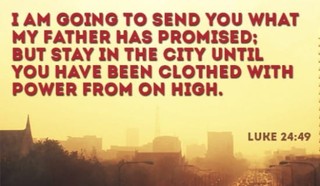
- Recent Translations
- All Translations
Luke 24:13
Share
Settings
On the Road to Emmaus
13 Now that same day two of them were going to a village called Emmaus, about seven miles[a] from Jerusalem.Images for Luke 24:13

Luke 24:13 in Other Translations
Luke 24:13 Meaning and Commentary
And behold two of them went that same day
Two of the disciples, as the Persic version reads; not of the eleven apostles, for it is certain that one of them was not an apostle; but two of the seventy disciples, or of the society of the hundred and twenty that were together: one of these was Cleophas or Alphaeus, as appears from ( Luke 24:18 ) the other is, by some, thought to be Luke the Evangelist, as Theophylact on the place observes, who, out of modesty, mentions not his name; others have thought that Nathanael was the other person; and Dr. Lightfoot seems very confident, from ( Luke 24:34 ) ( 1 Corinthians 15:5 ) that the Apostle Peter was the other; but it is not certain who he was: however, this very remarkable affair happened, and therefore a "behold" is prefixed to it, on the "same day"; the first day of the week; the day on which Christ rose from the dead; and the third day from his death it was, see ( Luke 24:1 Luke 24:21 ) that these two disciples travelled:
to a village called Emmaus;
whither they might go either to see their friends, or upon some secular affair, or to be retired from the noise of the city, and be secure from danger by their enemies; or it may be this was the place of Cleophas's abode, who, with the other disciple, was returning home after the celebration of the passover. The place whither they went is particularly mentioned, not because it was a place of note, but for the certainty of the fact. It was now but a village, having been burnt since the death of Herod the great, by the order of Varus, the Roman governors F12; though it afterwards became a considerable city, if it is the same with Nicopolis, as Jerom asserts F13; though that rather seems to be the Ammaus, or Chammath of Tiberias, since it was situated by the lake of Genesareth. However, it is certain, that Emmaus is reckoned, by Josephus F14, one of their chief cities; and Jarchi, and Bartenora
F15 say, it is the name of a city; and Pliny F16 calls it a toparchy, and says it was watered with fountains; which agrees with the account the Jews give of it F17.
``R. Jochanan ben Zaccai had five disciples; all the time that he stood, or lived, they sat before him; when he departed, they went to Jabneh; and R. Eleazar ben Arach went to his wife, (owamal) , "at Emmaus", a place of pleasant waters, and a beautiful habitation.''It is mentioned, in company with Bethoron, and Lud, or Lydda: it is said F18,
``from Bethoron, to (owama) , "Emmaus", is the mountain; and from "Emmaus" to Lydda, the plain; and from Lydda to the sea, the valley.''Bethoron is mentioned as near Nicopolis, by Jerom; and perhaps is the same with Betholone in Pliny: in Emmaus was a market: at least there was a butcher's market in it; hence we read of, (owama lv) (Mylja) , "the shambles of Emmaus" F19; mention is made of a place so called, as in:
``So they went forth with all their power, and came and pitched by Emmaus in the plain country.'' (1 Maccabees 3:40)
``So the camp removed, and pitched upon the south side of Emmaus.'' (1 Maccabees 3:57)
``Now when Judas heard thereof he himself removed, and the valiant men with him, that he might smite the king's army which was at Emmaus,'' (1 Maccabees 4:3)Another Emmaus is here meant: which was from Jerusalem about threescore furlongs;
or seven miles and a half; for eight furlongs make a mile. Josephus F20 says the same, and confirms the account of the distance of this place from Jerusalem.
F12 Joseph. Antiqu. l. 17. c. 12.
F13 Epitaph. Paul. fol. 59. B. Catalog. Script. Eccl. fol. 98. B. Tom. I. & in Dan. viii. 14. Tom. V.
F14 Antiqu. I. 14. c. 18.
F15 In Misn. Ceritot, c. 3. sect. 7.
F16 Nat. Hist. l. 5. c. 14.
F17 Midrash Kohelet, fol. 74. 4.
F18 T. Hieros. Sheviith, c. 9. fol. 38. 4.
F19 Misn. Ceritot, c. 3. sect. 7. T. Bah, Cholin, fol. 91. 2. & Maccot, fol. 14. 1.
F20 De Bello Jud. l. 7. c. 27.
Luke 24:13 In-Context
Cross References 1
-
1.
Mark 16:12
Footnotes 1
- [a] Or about 11 kilometers